Medicine deals constantly with the prospect of improving the quality of life… and perhaps soon the quality of someone’s resurrection. As technology progresses and becomes more advanced in the fields of cryopreservation, reanimation, and nanobiology, the possibility of being frozen for the future is looking up. Regardless of whether you’d personally elect for such a procedure, there are already dozens of people who have had their bodies frozen! Here we’ll explore just what cryopreservation is and where medicine may be headed.
What is Cryopreservation?
Exiled to the realm of science-fiction for decades, cryopreservation may be closer to reality than most people know. So, how hard is it to freeze someone and zap them back to life years in the future?
While it sounds like a simple process, in theory, this couldn’t be further from the truth. Sure, we can already freeze and store small samples of sperm or even embryos, but scientists have had considerable difficulty when applying these techniques to entire human organs. Although it’s a significant hurdle to wake up several decades in the future, new research is showing promising breakthroughs.

The process of rapidly cooling tissue is officially referred to as cryonics.
First, let’s start with the basics:
Cryopreservation is all about the timing. Immediately after the heart stops beating, the body is introduced to a cocktail of preservatives such as glycerol and propanediol, in addition to other antifreeze agents. Next, several thousand liters of liquid nitrogen rapidly cool the body to the point where the cells stay intact and avoid taking in or expelling excess water. Although the true difficulty comes with reversing this process…
New Breakthroughs in Cryopreservation:
Now for the first time, scientists have been able to avoid the formation of ice crystals — a phenomenon which had previously entailed cellular destruction.
According to lead researcher John Bischof from the University of Minnesota:
“This is the first time that anyone has been able to scale up to a larger biological system and demonstrate successful, fast, and uniform warming of hundreds of degrees Celsius per minute of preserved tissue without damaging the tissue.”
To achieve this, the researchers mixed silica-coated iron oxide nanoparticles in a solution and applied an external magnetic field which resulted in an even heating of the samples. Although these results have demonstrated the ability to effectively thaw cryogenically preserved human tissue, we’re still far from jump-starting dead bodies. Even beyond the plausibility of cryogenics becoming a consumer procedure, the prospect of reanimation is still uncharted territory. With attempts at the world’s first head-transplant scheduled to take place, along with other research into the possibility of using neurochemical cocktails used to restart someone’s brain and consciousness, the complexity of it all is astronomical.
Will You Wake Up in the Future?
As of right now, there still hasn’t been any evidence of whether a mammalian brain, let alone one from a human, would wake up unscathed and fully functioning. Experts cite concerns of decreased mental functioning, a significant risk of sickness from lack of exposure to modern bacteria, and even extreme psychological shock of reanimation. To date, no human being has had their consciousness restored after an extended state of cryopreservation, however, science is growing closer each year.

A storage unit designed by Alcor Cyronics.
Think all of this is just a fad? Tell that to Alcor, a company ready to freeze your body tomorrow. For about $200,000 you can become a member and have your entire body cryonically preserved with the hope that reanimation technology emerges sometime in the future. While it’s unclear how soon full body or at least neurological reanimation will become available, some elect for this process with the prospect of uploading their memories or personhood to a robotic system.
Clearly, humanity is reaching the cusp of what may soon formally be known as “immortality,” though not without an incredible amount of research and development.
If you had the chance, would you freeze your body? Just your brain? Would you wake up as a cyborg in the year 2117? Let us know in the comments below!
